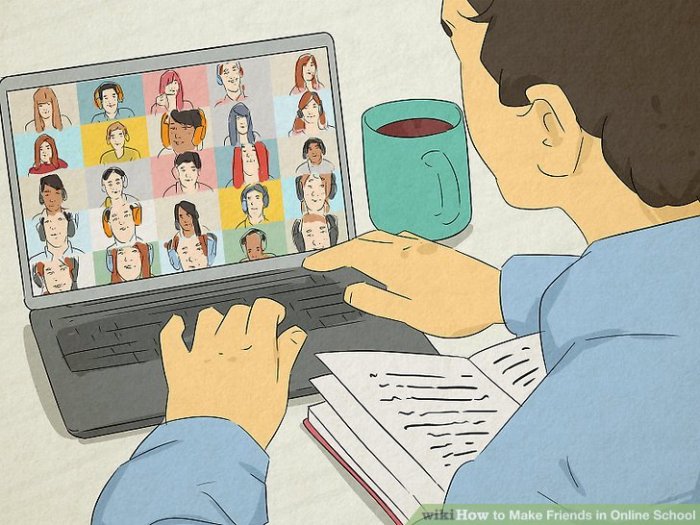
Exploring the realm of online education, this guide delves into the art of making friends virtually, offering insights and strategies to foster meaningful connections in digital learning environments.
From understanding the psychology behind online friendships to navigating challenges and embracing diversity, this topic covers essential aspects of forming and maintaining relationships in the virtual world.
Introduction to Online Education
Online education refers to the process of learning and obtaining education through the internet or other digital platforms. In today’s world, online education has become increasingly popular and significant due to its accessibility, flexibility, and convenience.
Benefits of Online Education
- Flexibility in scheduling classes and studying, allowing individuals to balance work, family, and education.
- Access to a wider range of courses and programs from institutions around the world, breaking geographical barriers.
- Cost-effectiveness by eliminating the need for commuting, textbooks, and sometimes even accommodation fees.
- Ability to learn at your own pace, catering to different learning styles and preferences.
Impact on Social Interactions and Networking
While online education offers numerous benefits, it also has an impact on social interactions and networking. Students in online courses may miss out on face-to-face interactions with peers and instructors, which can affect the development of social skills and networking opportunities. However, online platforms often provide forums, group projects, and networking events to facilitate virtual connections and collaborations.
Psychology of Online Friendships

Online education provides a unique platform for individuals to connect and form friendships virtually. The psychology behind these online friendships is influenced by various factors such as personality traits and communication styles.
Personality Traits and Friendships
- Introverted individuals may find it easier to open up and form connections online compared to in-person interactions.
- Extroverted individuals might thrive in online environments due to the opportunity to engage with a larger audience and network.
- Empathy, patience, and understanding play crucial roles in building meaningful friendships online.
Communication Styles in Online Relationships
- Clear and effective communication is essential for establishing trust and rapport with others in online education settings.
- Active listening and responding thoughtfully can deepen connections and foster friendships over time.
- Emojis, gifs, and other forms of digital expression can enhance communication and convey emotions in virtual interactions.
Special Education in Online Friendships
Individuals with special needs face unique challenges when it comes to making friends in online education. These challenges can include communication barriers, social skills deficits, and the need for additional support to navigate virtual interactions.
Creating an Inclusive Environment
It is crucial to create an inclusive and supportive environment for all students, including those with special needs, to foster friendships in online education. Some strategies to achieve this include:
- Providing accessible platforms and technologies to accommodate different learning styles and abilities.
- Offering personalized support and resources to help students with special needs feel included and valued.
- Promoting collaboration and teamwork among students to encourage social interactions and relationship building.
Importance of Empathy and Understanding
Empathy and understanding play a key role in fostering friendships in special education settings. By cultivating a sense of empathy towards others’ challenges and differences, students can develop a deeper understanding and appreciation for their peers. This can lead to more meaningful and supportive friendships that transcend boundaries and promote a sense of belonging for all students.
Standardized Tests and Social Connections
Standardized tests are a common feature in online education, often used to assess student performance and achievement. However, these tests can have a significant impact on students’ social interactions and friendships.
Impact of Standardized Tests on Social Interactions
Standardized tests can create an environment of competition and stress among students, leading to a focus on individual performance rather than collaborative learning. This can result in reduced opportunities for social interactions and the development of friendships.
Balancing Academic Pressure with Social Engagement
It is crucial to find a balance between academic pressure from standardized tests and social engagement to ensure a well-rounded educational experience. Educators can incorporate group projects, discussions, and interactive activities to promote collaboration and social connections among students.
Role of Extracurricular Activities in Promoting Friendships
Extracurricular activities play a vital role in promoting friendships beyond test scores. These activities provide students with opportunities to engage in shared interests, hobbies, and passions, fostering meaningful relationships and social connections outside the academic realm.
Survival and Emergency Preparedness for Online Friendships
In the fast-paced world of online education, unexpected emergencies can pose challenges to maintaining friendships. It is crucial to be prepared and have strategies in place to stay connected and support friends during times of crisis.
Identifying Potential Challenges
During emergencies, individuals may face internet connectivity issues, power outages, or personal emergencies that limit their ability to engage with friends online. These challenges can lead to feelings of isolation and disconnection.
Tips for Staying Connected and Supporting Friends
- Establish alternative communication channels such as phone numbers or messaging apps to stay in touch in case of technological disruptions.
- Check in regularly with friends to offer support and ensure their well-being, especially during stressful situations.
- Organize virtual hangouts or study sessions to maintain a sense of community and connection even during difficult times.
Importance of Building a Strong Support Network
Having a strong support network in the virtual learning environment is essential for emotional well-being. Friends can provide comfort, guidance, and a sense of belonging during challenging times, helping individuals navigate crises with resilience.
Effective Teaching Strategies for Fostering Online Friendships
In the online education setting, teachers play a crucial role in creating a sense of community and fostering friendships among students. By implementing effective teaching strategies, educators can help facilitate peer-to-peer connections and enhance the overall virtual learning experience.
Significance of Group Projects and Collaborative Tasks
- Group projects and collaborative tasks provide students with opportunities to work together towards a common goal, fostering teamwork and communication skills.
- Working in groups allows students to interact with their peers, share ideas, and build relationships based on mutual understanding and respect.
- Through collaboration, students can learn from one another, leverage each other’s strengths, and develop a sense of camaraderie that transcends the virtual classroom.
Role of Mentorship and Guidance
- Mentorship and guidance from teachers can help students navigate social dynamics in the online learning environment, especially for those who may struggle with forming connections.
- Teachers can act as role models, offering support, encouragement, and advice to students as they navigate the complexities of virtual friendships.
- By providing mentorship, educators can help students build social skills, resolve conflicts, and establish meaningful connections with their peers.
Educational Background and its Influence on Friendships

When it comes to online education, students’ educational backgrounds play a significant role in shaping how they approach making friends in virtual classrooms. These backgrounds can vary widely, from traditional schooling experiences to homeschooling or alternative educational paths. Understanding these differences is crucial in fostering a supportive and inclusive online community.
Impact of Cultural Differences on Communication and Relationship-building
Cultural differences can greatly influence how students communicate and build relationships in online education settings. Factors such as language barriers, social norms, and communication styles can all impact the dynamics of virtual friendships. It is essential to be mindful of these differences and strive to create an environment that respects and celebrates cultural diversity.
- Students from collectivist cultures may prioritize group harmony and cooperation in their interactions, while those from individualistic cultures may value independence and self-expression.
- Embracing cultural diversity can enrich discussions and collaborations, offering different perspectives and insights that enhance the overall learning experience.
- Encouraging open-mindedness and empathy can help bridge cultural divides and foster meaningful connections among students from diverse backgrounds.
Creating a Culturally Inclusive Environment for Cross-cultural Friendships
Building a culturally inclusive environment is essential for promoting cross-cultural friendships in online education. By acknowledging and valuing the unique perspectives and experiences of each student, educators can create a space where everyone feels respected and heard.
Embracing cultural diversity not only enriches the educational experience but also prepares students for success in an increasingly globalized world.
- Organizing cultural exchange events, language clubs, or virtual field trips can provide opportunities for students to learn about and appreciate different cultures.
- Implementing inclusive teaching practices, such as using diverse materials and examples, can help create a welcoming and supportive learning environment for all students.
- Encouraging cross-cultural collaborations on projects or assignments can foster mutual understanding and empathy among students from various cultural backgrounds.
Engaging Education Books for Understanding Online Friendships
Exploring the dynamics of online friendships in educational settings can offer valuable insights into the intersection of social connections and learning. Educational books provide a comprehensive look at the complexities of forming and maintaining relationships in online environments, shedding light on the impact of technology on human interactions.
Educational Books on Online Friendships
- “Alone Together: Why We Expect More from Technology and Less from Each Other” by Sherry Turkle: This book delves into the effects of technology on relationships and how it influences communication in online settings. Turkle’s research offers a critical perspective on the challenges of forming meaningful connections in a digital age.
- “The Connected Child: Bring Hope and Healing to Your Adoptive Family” by Karyn B. Purvis: While focusing on adoptive families, this book provides valuable insights into building connections and fostering relationships in non-traditional settings. The principles discussed can be applied to online friendships, highlighting the importance of empathy and understanding.
- “It’s Complicated: The Social Lives of Networked Teens” by Danah Boyd: Boyd’s exploration of how teenagers navigate social media platforms offers a glimpse into the intricate dynamics of online interactions. Understanding the experiences of young individuals in digital spaces can provide educators with valuable perspectives on fostering online friendships.
In conclusion, mastering the art of making friends in online education requires empathy, effective communication, and a willingness to adapt to diverse educational backgrounds. By implementing the strategies discussed, individuals can create a supportive network of friends in the digital realm.
Key Questions Answered
How can I overcome shyness and initiate conversations with classmates in online education?
To overcome shyness, try starting with small talk, joining online study groups, and participating actively in virtual discussions to gradually build rapport with your classmates.
What are some effective ways to maintain long-lasting friendships in online education?
Maintaining long-lasting friendships involves regular communication, showing support during challenging times, and actively engaging in shared interests or activities to strengthen the bond over time.
How can educators promote a sense of community and friendship among online students?
Educators can promote community and friendship by encouraging collaboration through group projects, creating virtual social events, and fostering a supportive online learning environment where students feel valued and connected.






